I dreamed of visiting Athens, Greece for years. I studied Classics in university, and learned Ancient Greek and Latin as some of my core skills, as well as taking classes on ancient history. As you can probably imagine, this Athens itinerary is packed full of the most significant and the most beautiful places to visit in Athens, based on my background in Classics.
Not only that, but my boyfriend ALSO studied Ancient Greek and classical archaeology, so get ready for a complete nerdfest throughout this guide. Don’t worry, it’ll be fun 😉
Apart from Classical sites (which, let’s be honest, can get a bit repetitive if you don’t know what to look for), this guide also explains where to eat in Athens, the best cafes you can work from, as well as my personal favorite aspect of Athens: incredible rooftop bars with Acropolis views!
Keep reading for a complete guide to seeing Athens in 3 days, the best things to do in Athens, recommendations for day trips, where to eat, drink, and work, as well as the inside scoop on the absolute best photography locations in Athens for my fellow shutterbugs.
And with that, let’s look at what’s in store for us in Athens! I absolutely loved visiting Athens in February of 2020, and am looking forward to a chance to book-end an upcoming trip there later this Summer.
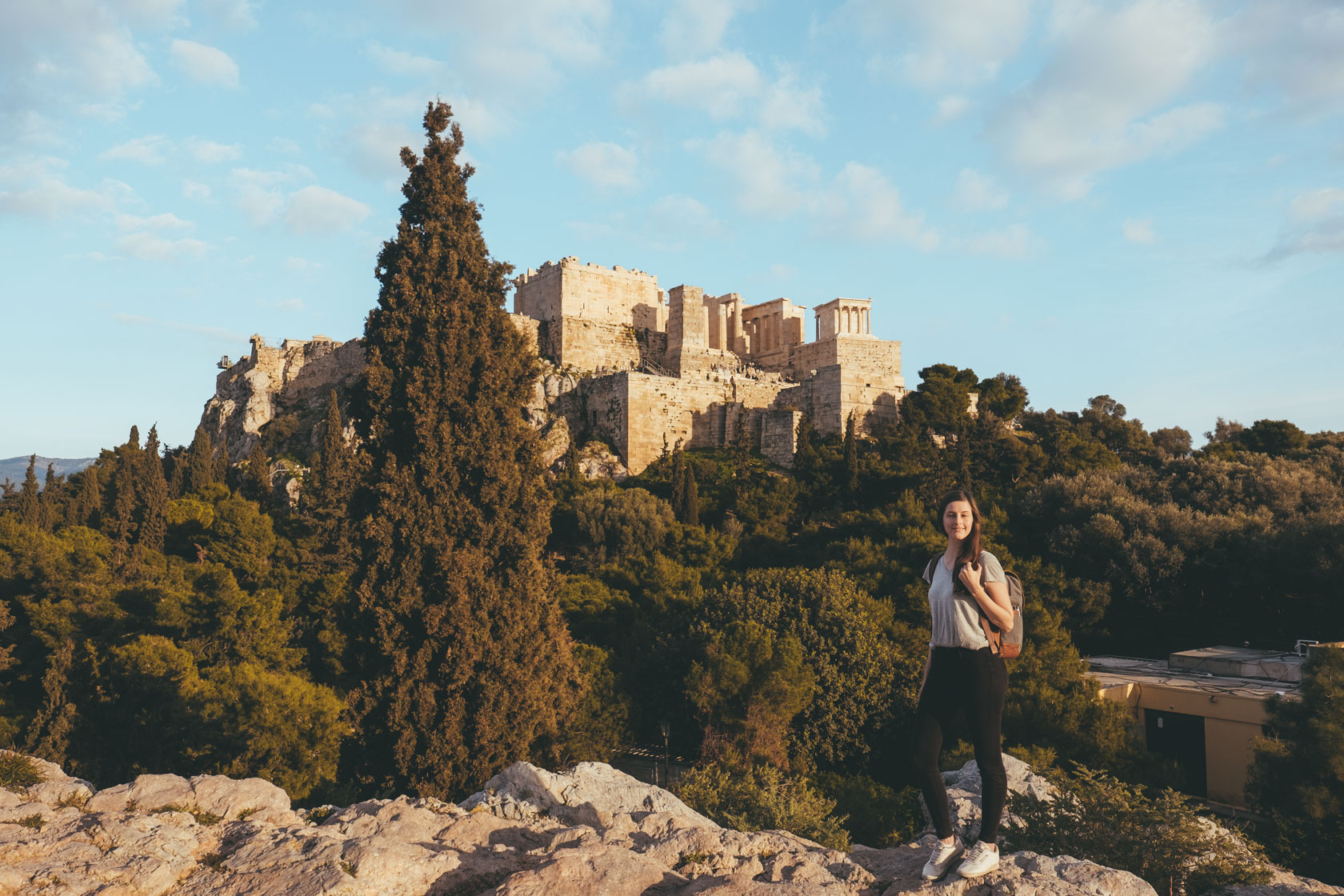
What you’ll see in three days in Athens, Greece
I stayed in Athens for 8 days (9 Feb - 17 Feb, 2020) while building this itinerary and exploring the city, and packed down my absolute best experiences into these three days. I was lucky enough to visit Athens with not one, but TWO people who’ve seen the city before, so our combined experience makes this a very complete itinerary.
Here’s what you’ll see in Athens for three days:
- Top highlights of Athens including the Acropolis, Acropolis Museum, Aeropagus, Ancient Agora of Athens and more sights.
- Views of the Acropolis from all angles such as Filopappou Hill and Lycabettus Hill, as well as more ancient sites to round out your Athens experience.
- Day trip to the Peloponnese region, including Mycenae, Epidaurus, and Nafplio. The must-do day trip for lovers of ancient history, featuring the world’s best-preserved amphitheatre.
Where to stay in Athens
Athens is an extremely walkable city, especially when it comes to the city center. You can walk end-to-end in about 20 minutes, and a taxi ride from one side to the other costs just 4-6 EUR. My main tip would be simply to stay away from major roads, because traffic (and especially motorcycles!) can get pretty noisy. Otherwise, you can find stunning views and low prices all over the city.
Option 1: Airbnb (for longer stays) – You’ve got two main options in Athens for accommodation: booking a hotel or staying in an Airbnb. I spent a total of 8 days in Athens while building this itinerary, so there was no question I wanted to get an apartment. I stayed in this Airbnb with an Acropolis view located right at the border of the historic center in the Kerameikos neighborhood.
Option 2: Hotel in a central neighborhood (for shorter stays) – For a shorter stay, it would be affordable to stay in the two best districts for short-term visitors: Plaka or Kolonaki . Here are some of the hotels with the best reviews and locations in these neighborhoods:
-
A for Athens
(9.2 “Wonderful” rating) –
A for Athens is located right on Monastiraki Square, making it one of the
most convenient locations in the entire city. You can also reach it on a direct
metro from the airport and avoid hauling your luggage over uneven streets.
Bonus: the rooftop bar at A for Athens is legendary and offers this amazing view (see below).
- Coco-Mat Hotel Athens (9.3 “Wonderful” rating) – Even though I opted for an Airbnb because of my long stay, Coco-Mat was the hotel recommended to me by a friend who visited Athens and loved staying there. Its location in Kolonaki is slightly upscale, convenient for shopping, and located near Lycabettus Hill, one of the best places to watch sunset in the entire city.
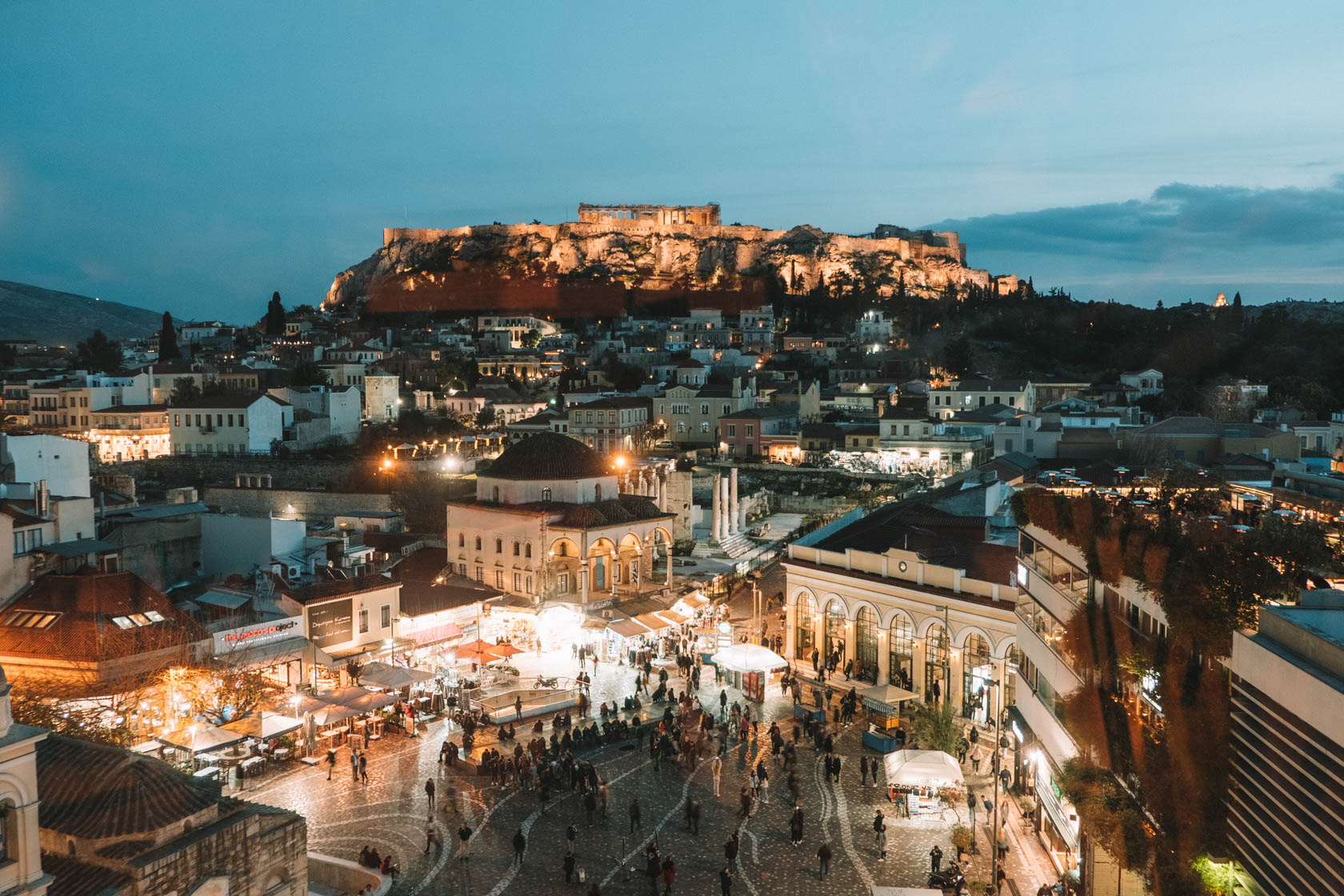
Click here to check availability for rooms with an Acropolis view at A for Athens during your visit.
Tip for female travelers – Avoid staying in the Omonia area. While it’s improved a lot thanks to police presence in recent years, it’s not somewhere you want to walk around at night. Especially for female travelers, there are a lot of men out and street harassment isn’t uncommon.
What to pack for Athens
Depending on what season you visit Athens, you can get pretty cold temperatures in the Winter (though warmer than most of Europe) or scorching hot days with full sun out. Regardless of which season you visit, you’re going to want to pack these essentials for Athens:
- Sunglasses and sunscreen – Whether it’s Winter or Summer, you need to be prepared for sun! I highly recommend
this
awesome SPF 50 Japanese sunscreen
if you’re
serious about sun protection!
- Walking shoes with traction – You’ll be walking over stones and marble that have been worn down by feet for
thousands of years. It can get slippery! Make sure your shoes are comfortable for walking and have a bit of grip.
- Anti-theft handbag or backpack – Athens is mostly a safe city, save for petty theft and pickpocketing. You need to mind your belongings in Athens, especially in crowded squares and on
the metro.
This theft-proof backpack
has over 1,000 positive reviews on Amazon.
- An offline-friendly guidebook – Speaking of not making yourself a target, I prefer not to walk around with my expensive iPhone in my hand when navigating a city known for petty theft. I personally own this Greece travel guide (which was just updated!) and reference it every time I go to Greece.

Athens, Greece 3-day itinerary
Day 1: Top highlights of Athens
Today we’re going to start early and be one of the first at the Acropolis , the heart of Ancient Athens. You’ll see some of the most impressive archaeological sites, dating back as far as 447 BC (making it almost 2,500 years old!).
After soaking in the main sights like the Parthenon, the Temple of Athena Nike, and the Erechtheion, you’ll head to the Aeropagus for some of the best up-close views of the Acropolis. Once we’ve seen the sights, we’ll head to the Acropolis Museum to learn more about what we saw at one of the world’s best museums.
Finally, we’ll round off the day of ultimate ancient highlights with Ancient Agora of Athens , and a few other sights in the area before calling it a day.
Acropolis
The Acropolis is easily the highlight of Athens, and your best chances for enjoying it without massive crowds is to visit the Acropolis first thing in the morning, when it opens at 8AM. In terms of buying tickets, you can always check up-to-date Acropolis ticket prices here .
Summer hours – April 1 to October 31: 8 am to 8 pm (last admission 7:30 pm)
Winter hours – November 1 to March 31: 8 am to 5 pm
One awesome thing about visiting Athens in Winter is that the prices for almost all archaeological sites are reduced, just don’t make the mistake of buying the combination ticket because that’s not reduced in Winter and the lines are short enough you won’t need to wait much.
Summer prices – April 1 to October 31: 20 €
Winter prices – November 1 to March 31: 10 €
Unless you’re an ancient history nerd like me, you may want to forego the combination ticket and opt for buying tickets as you go. The one good thing is that the 30€ combo ticket can save you waiting in line for other sights, but do check exactly what’s included and what you’re interested in seeing. You can also buy the combo ticket at a less popular site in order to avoid waiting in line at the Acropolis 😉
Here are the main sights you’re going to want to see while you’re on the Acropolis:
Theatre of Dionysos
This theatre is special because it’s considered to be the world’s first theatre. If you’ve ever read some of the most famous Greek plays, for instance by Aeschylus, Sophocles, Euripides, Aristophanes, or Menander – you can also taxi between some locations if you’re not down for walking those plays were performed here!
That means that performances of Oedipus at Colonus (from whom we have the concept of the “Oedpius complex”) or Lysistrata (a play about women stopping a war by withholding sex from their husbands) happened here first. Epic, right? (Or, “tragic”, at least in the case of Oedipus 💀)
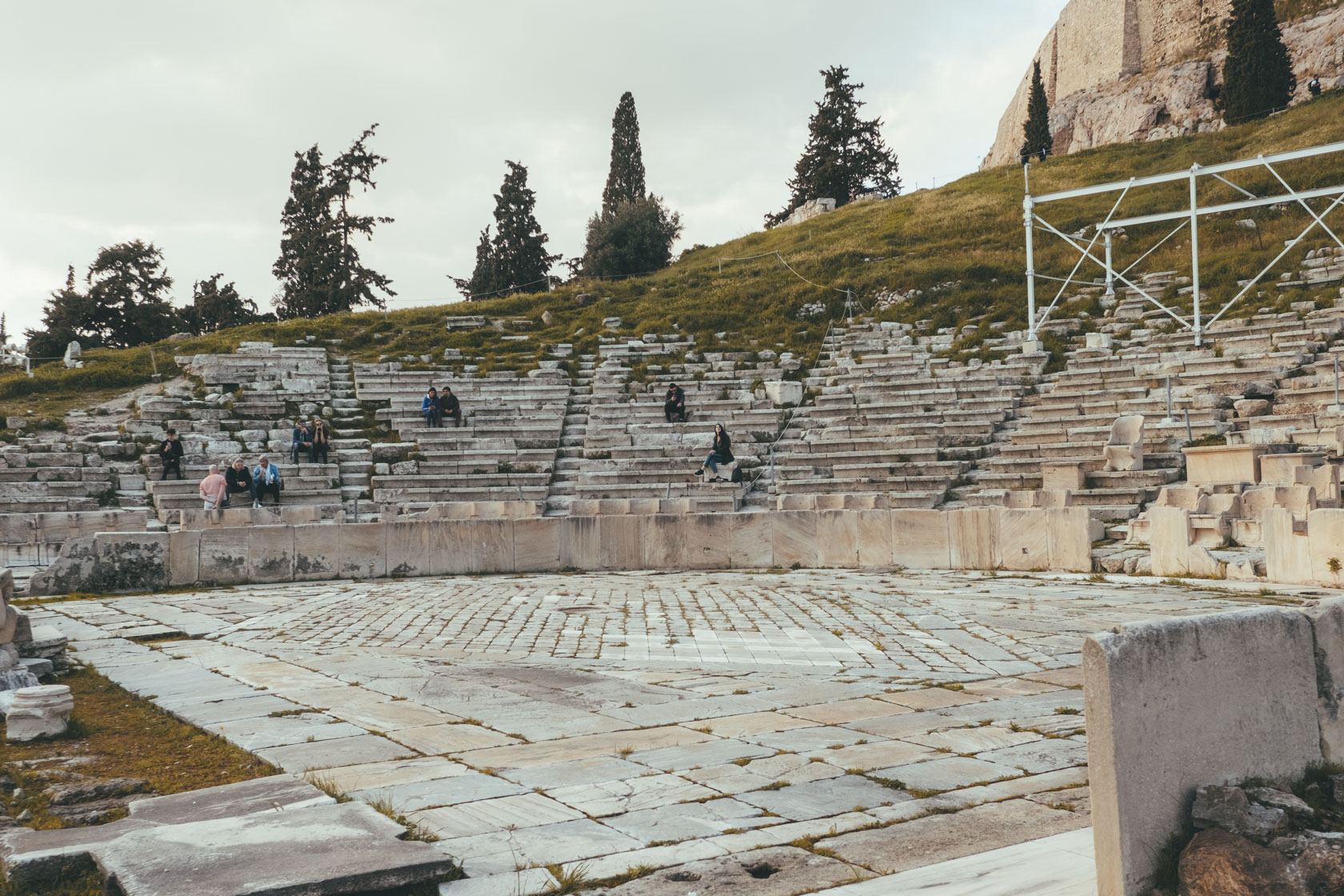
Today the theatre looks pretty small compared to others, but that’s because only a fraction of the original seating is preserved. It had a capacity of 17,000 when it was in use in antiquity, and used to be much larger than the next theatre you’ll see: Odeon of Herodes Atticus.
Odeon of Herodes Atticus
Built between 160AD – 174AD, “Herodeon” as it’s called by locals was a tribute to the late wife of Herodes Atticus. The Odeon of Herodes Atticus is done in a much more Roman style, compared to the Theatre of Dionysos (mentioned above). What people often don’t realize is that most theatres use the circular part as the location for the choir, whereas the stage itself is located behind it on an elevated level. If you look in this photo, you should be able to see the stage!
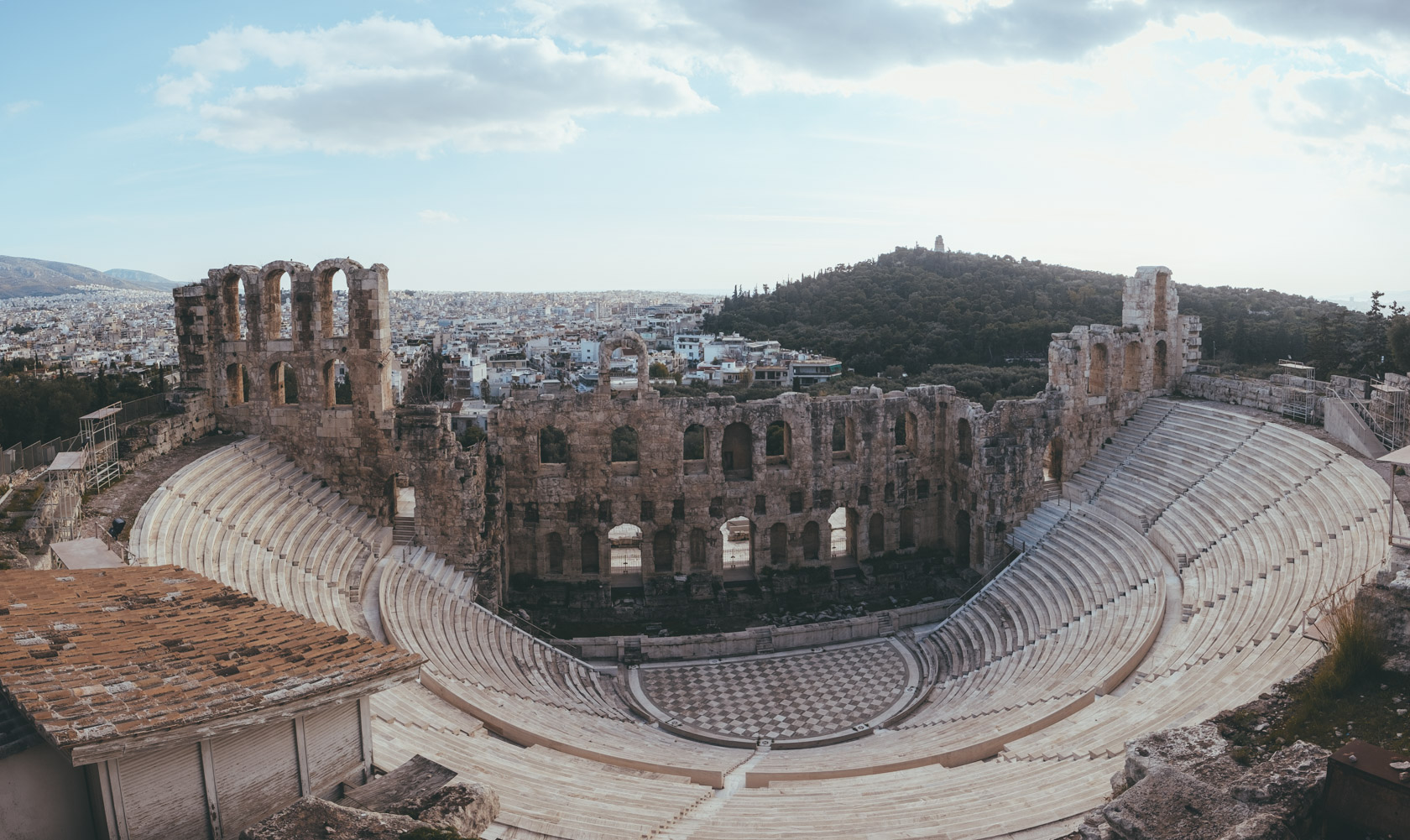
Today, this Odeon seats over 4,680 people and there are even events still held here. Keep an eye on the Athens and Epidaurus Festival 2020 Facebook Page for updates on the performances you can expect this Summer!
Parthenon
Ah, the Parthenon. So beautiful, so very under construction. One thing you’ll notice about visiting Athens is that many sites are under construction pretty much all the time, and you can expect at least one thing you want to see to be closed for renovation!
The Parthenon is the most important surviving building of Ancient Greece. So, in that sense, it’s no wonder they put so much effort into constantly restoring and preserving it!
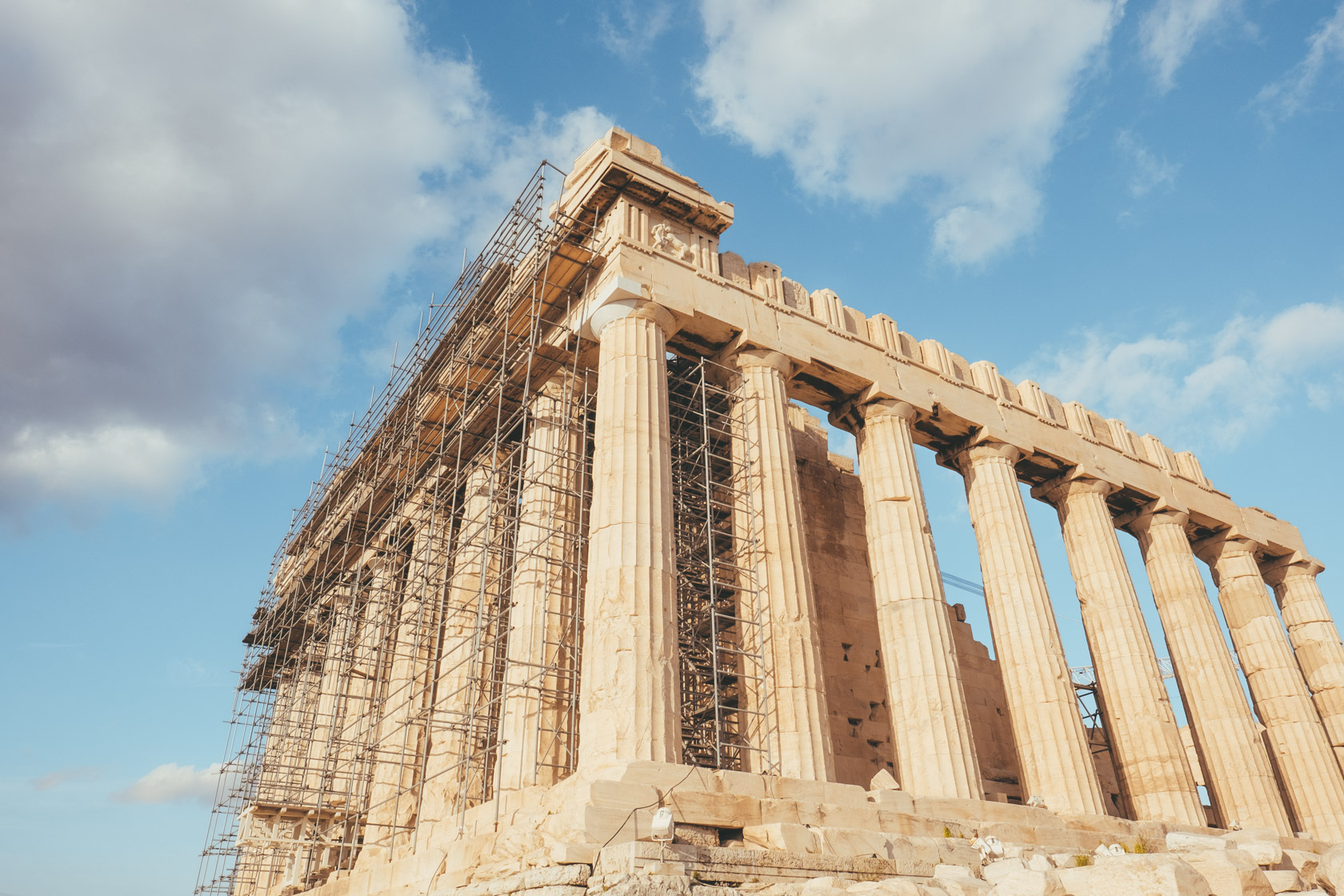
Despite all the steel, the Parthenon is magnificent. It was built between 447 and 438 BC and is actually the third version of the Parthenon, replacing two previous versions. In the mean time, it’s been converted to both a Christian church and a mosque, depending on who was in power at the time.
Temple of Athena Nike
The Athenians were all about Athena – after all, they named their city after her. She was considered the goddess that would stand by Athens in the time of war. Athena has several forms, but the one honored here is called “Athena Nike” where “Nike” means “Victory” in Ancient Greek. Our word for “Victory” comes from the Latin word “Victoria”, but the Greek version is actually where the Nike shoe brand gets its name. The more you know 🌈
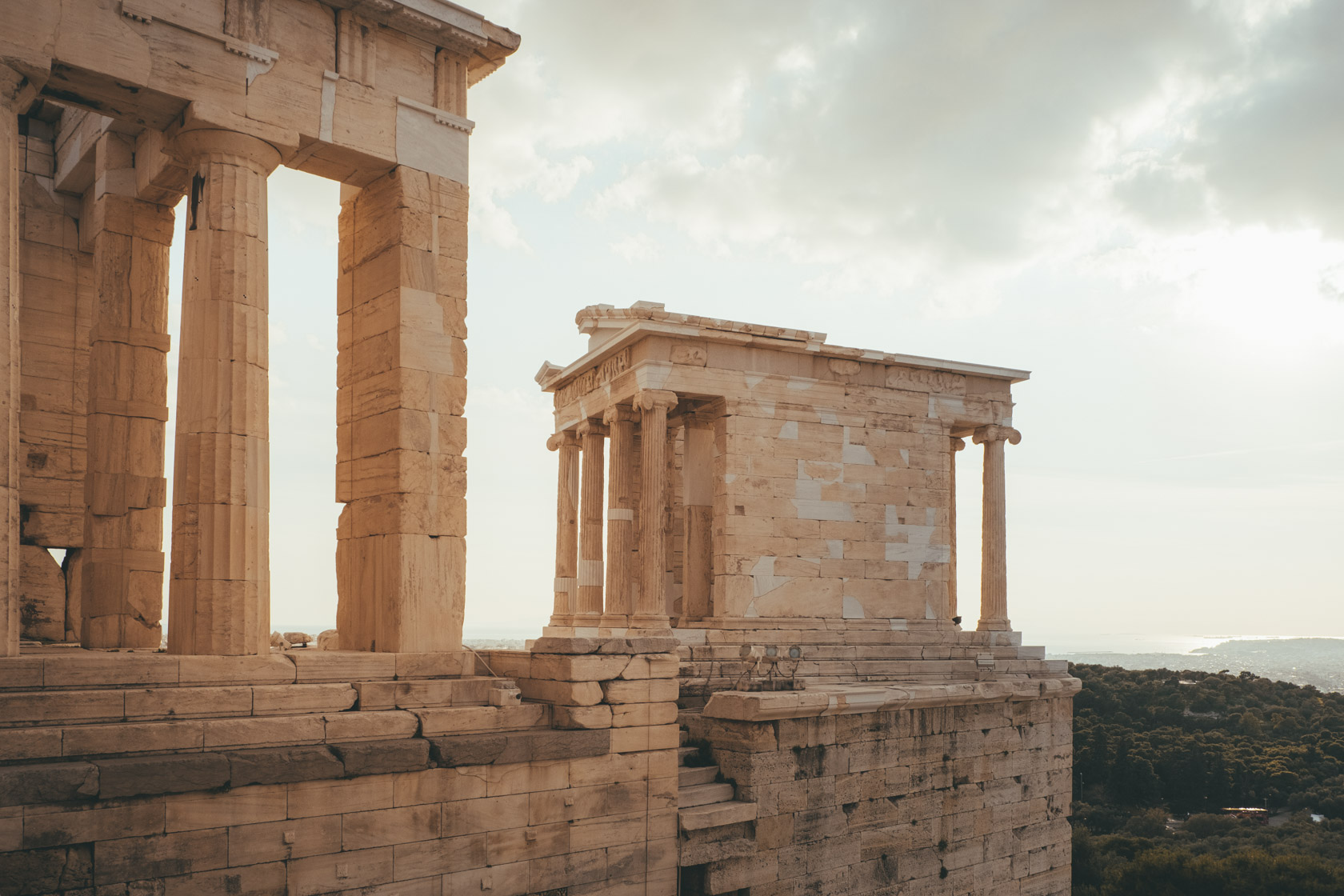
The Temple of Athena Nike is pretty small, and is part of the overall entryway onto the Acropolis, called the Propylaia. On this temple you can see depictions of historic battle scenes, such as the Battle of Marathon.
Erechtheion
The Erechtheion is most famous for its Caryatids, which are the columns made of female figures, located on its South porch. Even though the originals are located in the Acropolis Museum, these replicas are still beautiful and make the Erechtheion a stunning ancient site.
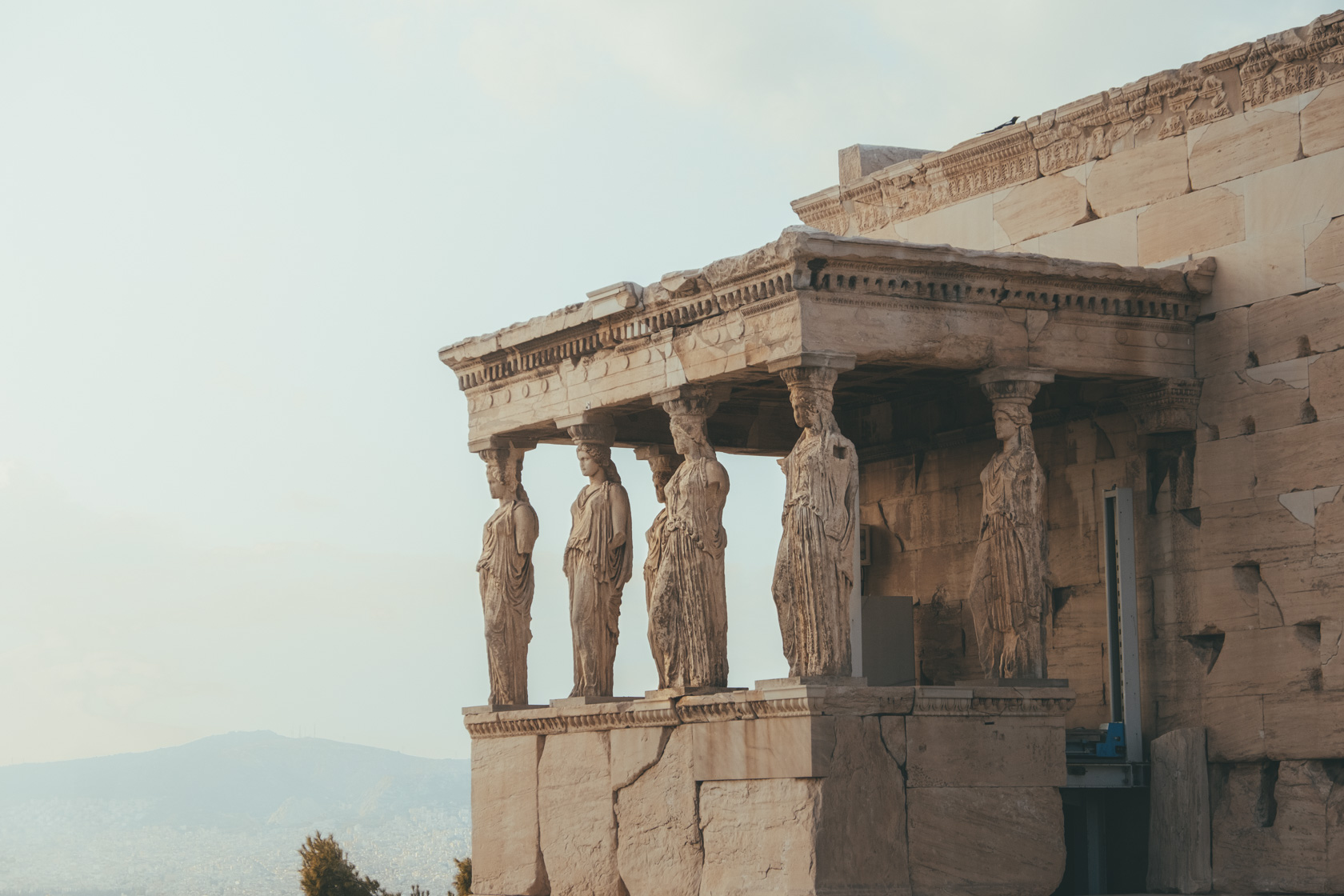
One of the reasons the Erechtheion is so famous is because it has such an unusual and asymmetrical shape. It’s especially unusual considering that its neighbor, the Parthenon, is so geometrical in comparison. Named after the mythical Athenian king Erechtheus, make sure to snap photos of the beautiful columns when you visit!
Aeropagus
Once you leave the Acropolis, you can walk towards the Aeropagus , also called “Mars Hill”. This is the location where St. Paul is said to have delivered a famous speech to the Athenians explaining that their gods were all wrong, more or less, in Acts 17:24. Besides being a place that Christians visit for that reason, it’s just a great spot to take a photo in front of the Acropolis.

Acropolis Museum
The Acropolis Museum was voted the sixth best museum in the world according to Trip Advisor’s traveler’s choice awards. Sixth in the world! In case you’re wondering, the Acropolis Museum ranked below Musée d’Orsay, but above the Louvre! Fancy, huh?

Whether you want to visit the Acropolis Museum before or after seeing the Acropolis, is really up to you. I personally went to the museum first, but I think it might’ve been more useful to go afterwards since I would’ve known which buildings to read about later in the museum.
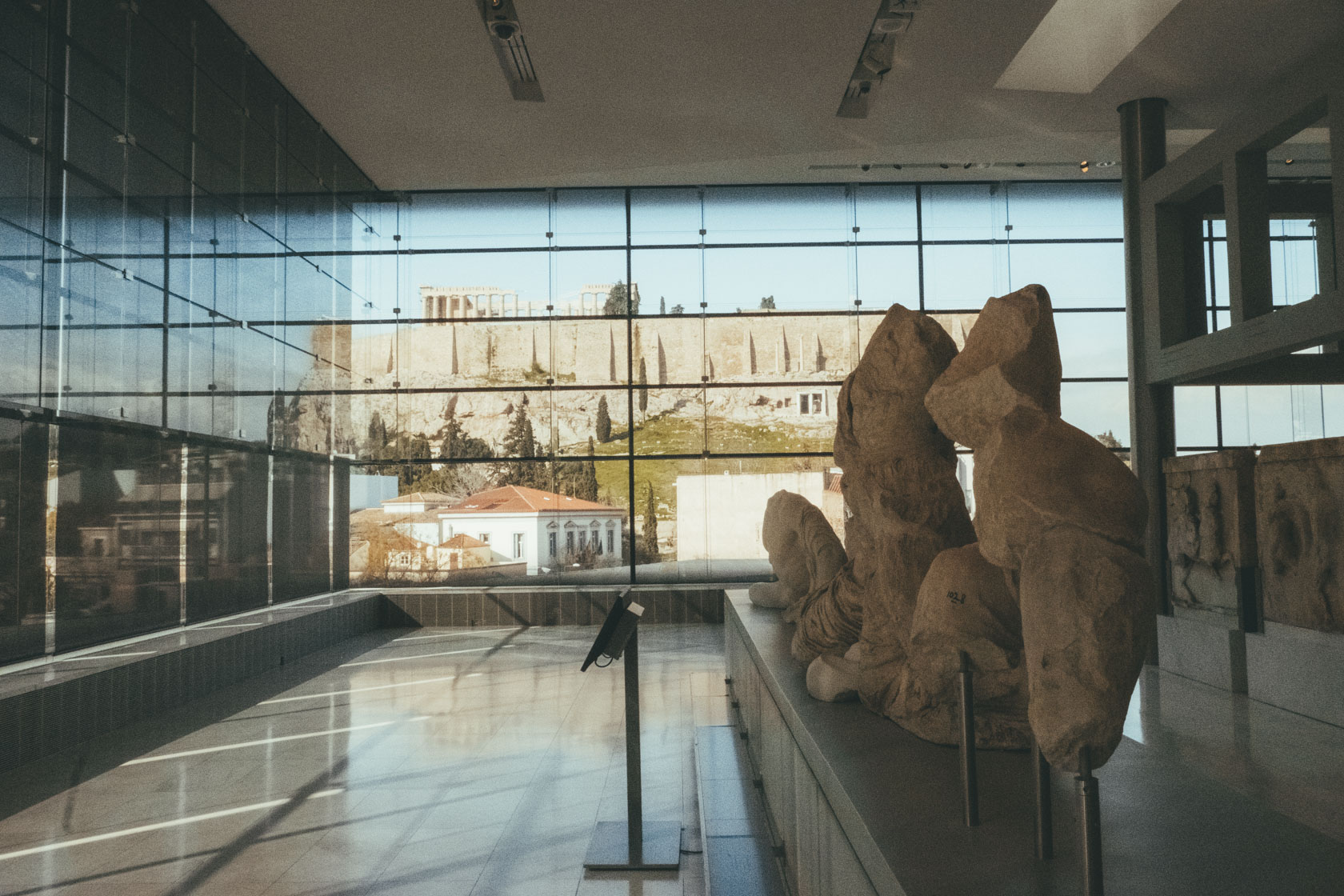
Ancient Agora of Athens
At the foot of the Acropolis, you’ll want to visit the Ancient Agora of Athens. This is included in your combination ticket, if you decide to buy that. Most of what you can see here is in ruins and takes a bit of imagination, but there are two main pieces in good shape: the Stoa (the long building pictured below on the left) and the Hephaisteion.
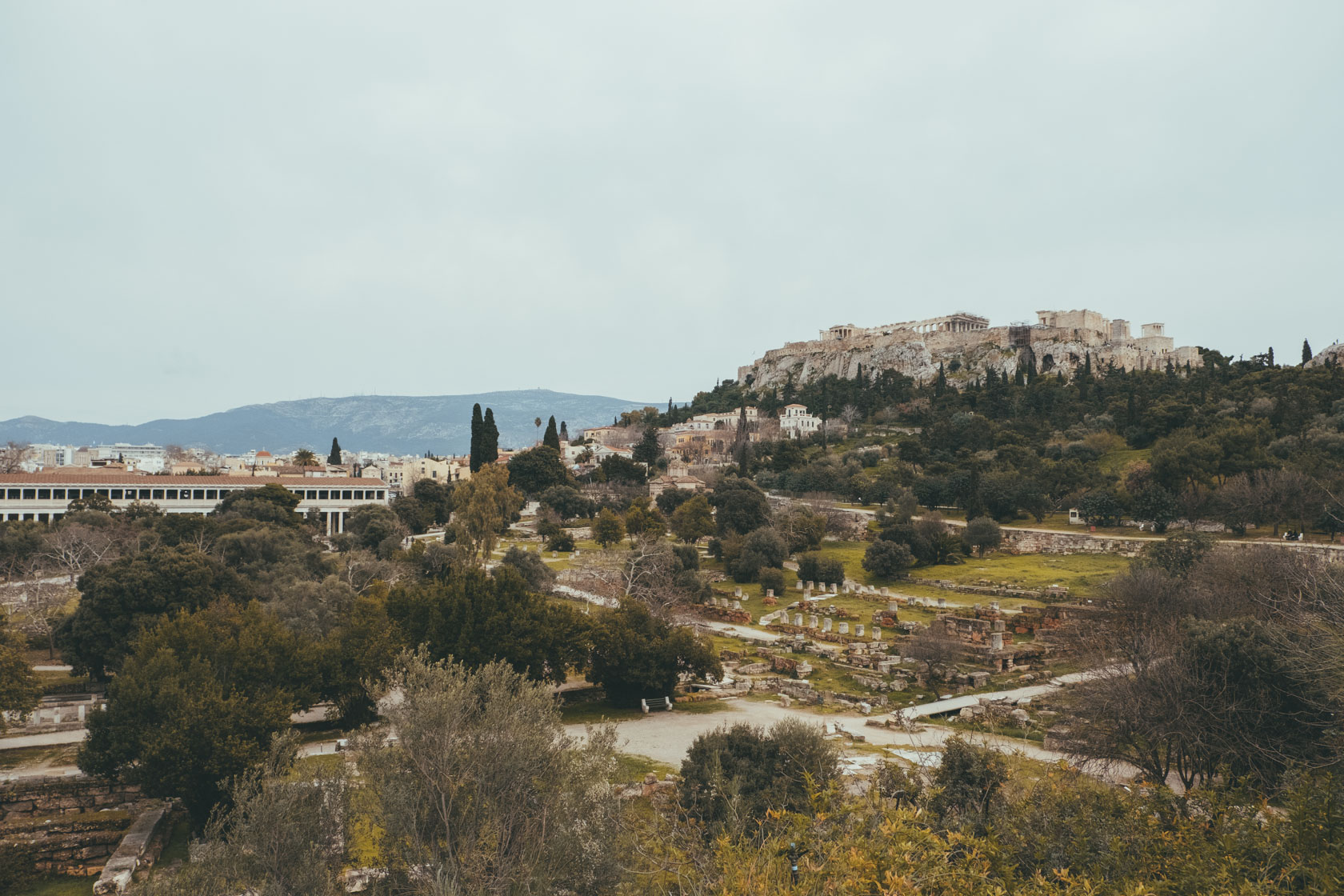
Temple of Hephaestus (the Hephaisteion) is one of the best preserved temples in Athens. The funny thing is that it’s a rather unremarkable temple compared to many, and the only reason they think it was for Hephaestus is because they found an armory nearby (and Hephaestus was the god of metal working, craftsmanship, and fire).
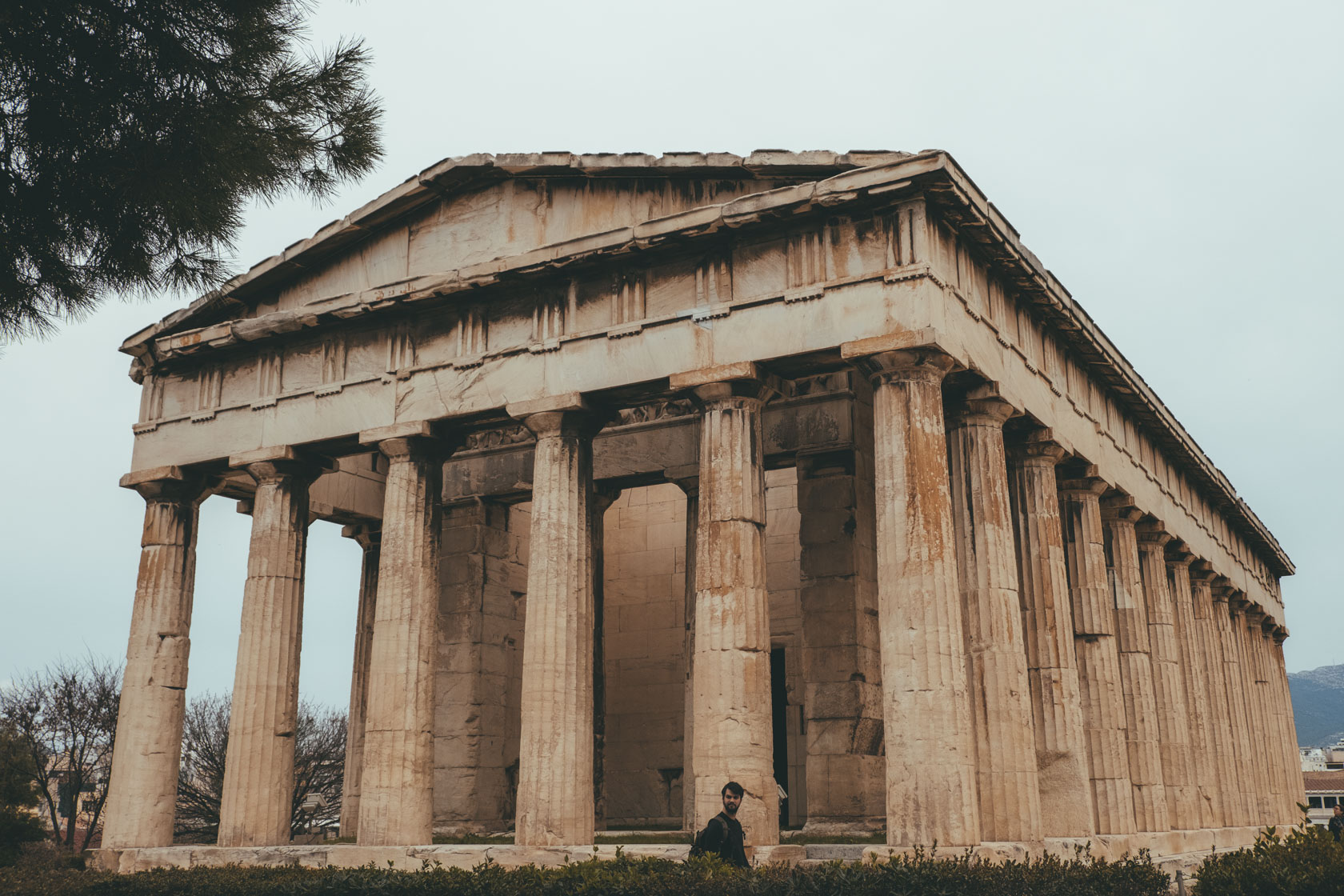
Believe it or not, they even continued to use this temple as a museum until the 1930s! Today you can’t go inside anymore, but it’s in great shape from the outside.
Hadrian’s Library
Hadrian actually wasn’t Greek but Roman, and there is a fair amount of Romanization to be found throughout Athens given that the Romans conquered Greece at the Battle of Corinth in 146 BC. One of the reasons visiting Corinth is not that interesting as an Athens day trip is because the Romans utterly destroyed it to “set an example” 😬
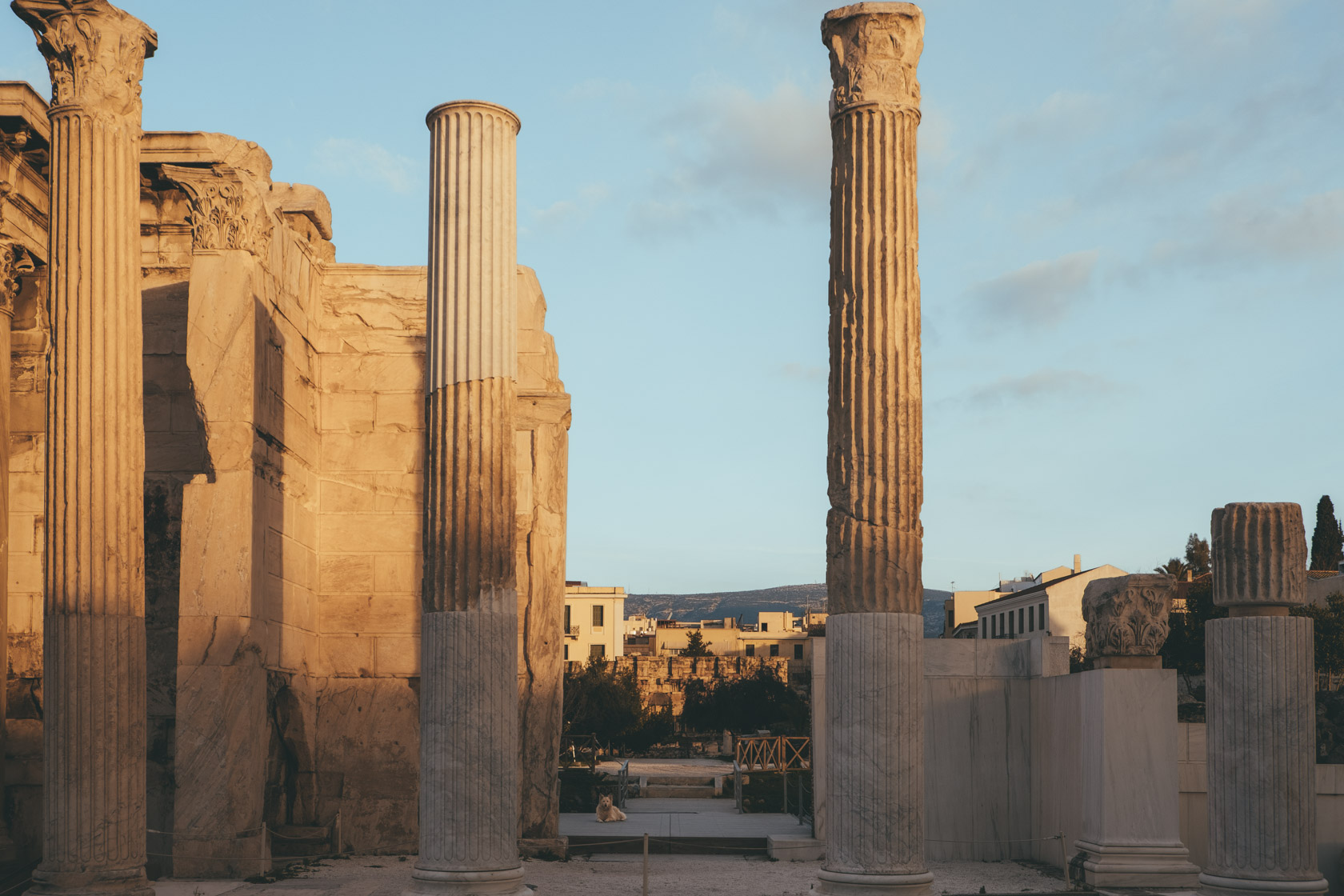
Anyways, Hadrian’s library was massive! As with many of the buildings in Greece, it was repurposed depending on who was in charge. During the Byzantine empire, three churches were built at the site, and you can see their remains today. As a library, it used to hold papyrus books, reading rooms, and had lecture halls.
Monastiraki Square
Monastiraki Square is by in large the main square of Athens. Looks can be deceiving though, because it definitely doesn’t look as nice from ground level. But if you head up to A for Athens rooftop bar, you can snap this awesome photo. Make sure to reserve, it can fill up quickly, especially for people like me who are looking to snap a sunset photo with the Acropolis illuminated!

Day 2: Views of the Acropolis from all angles
Today there’s going to be some walking, so make sure you have good shoes on! We’re going to start at Kerameikos Cemetery , where some of the most famous Athenians of all time were buried and the location of the city gates to Athens.
Then we’ll walk around Filopappou Hill and stop at Pnyx , my favorite place for photos of the Acropolis. We’ll loop back down for lunch and pop by Hadrian’s Arch on our way to the Temple of Olympian Zeus on our way to the ultra impressive Panathenaic Stadium .
Our day will end at Lycabettus Hill , where you can either take a cable car or hike to the top for the best sunset views of Athens in the entire city.
Kerameikos Cemetery
The funny part about the fact that I stayed across the street from Kerameikos is that it’s actually a place where visitors were made to sleep for a night before entering Athens. There was a guesthouse outside the city gates where visitors would stay, surrounded by the graves of the greatest Athenians of history such as Aristotle.
Pretty humbling huh? Kerameikos is a larger site than you might expect, and has two main draws: its pathway with the famous bull statue (seen below) and the ruins of the ancient city gates of Athens.
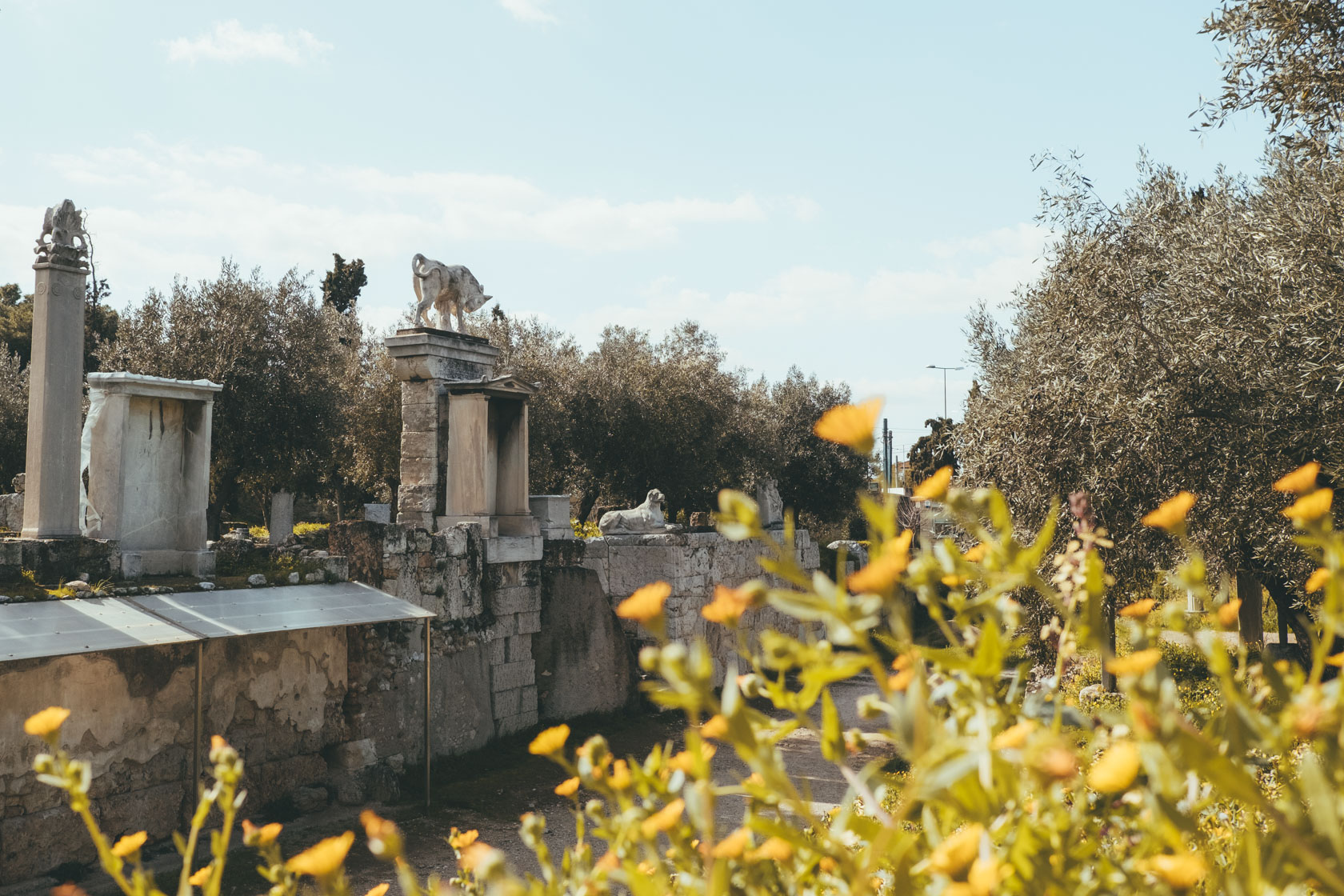
The Pnyx
The Pnyx is actually also located on Filopappou Hill, but before you actually reach the monument that most people associated with Filopappou. The reason it’s worth visiting is that you can get an amazing frontal view of the Acropolis with nothing but greenery below. The entire city melts away and it’s just you and a two millenia old monument to the greatness of Athens!
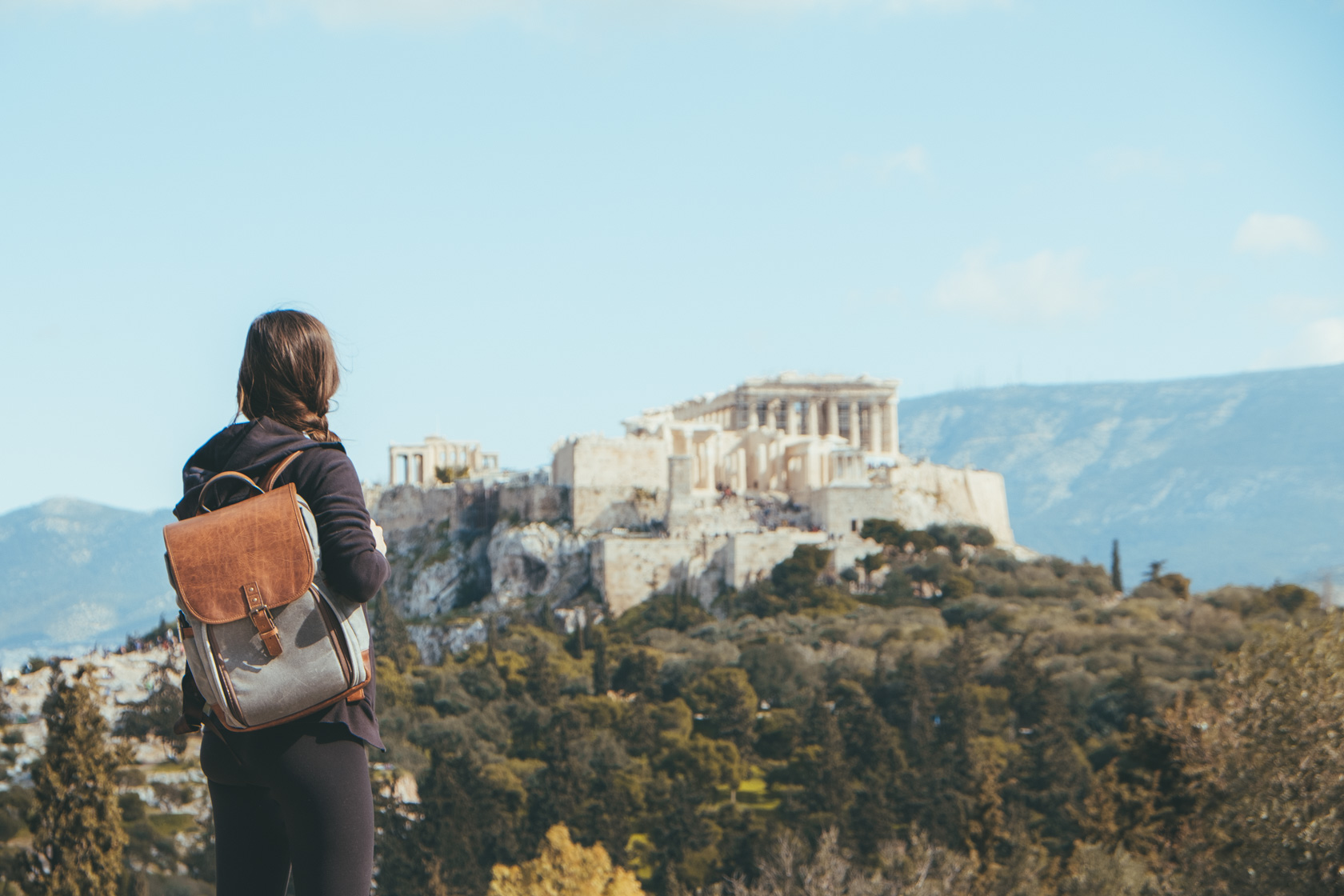
Filopappou Hill
Continue up the same hill and you’ll eventually reach the Filopappou monument, and another Acropolis viewpoint. Many Athens travel guides will tell you this is one of the best places to see the Acropolis, but I would disagree. You do get a nice view of the Parthenon, but the hill looks a bit disorganized. Still worth seeing, but I prefer the view from the Pnyx location instead!
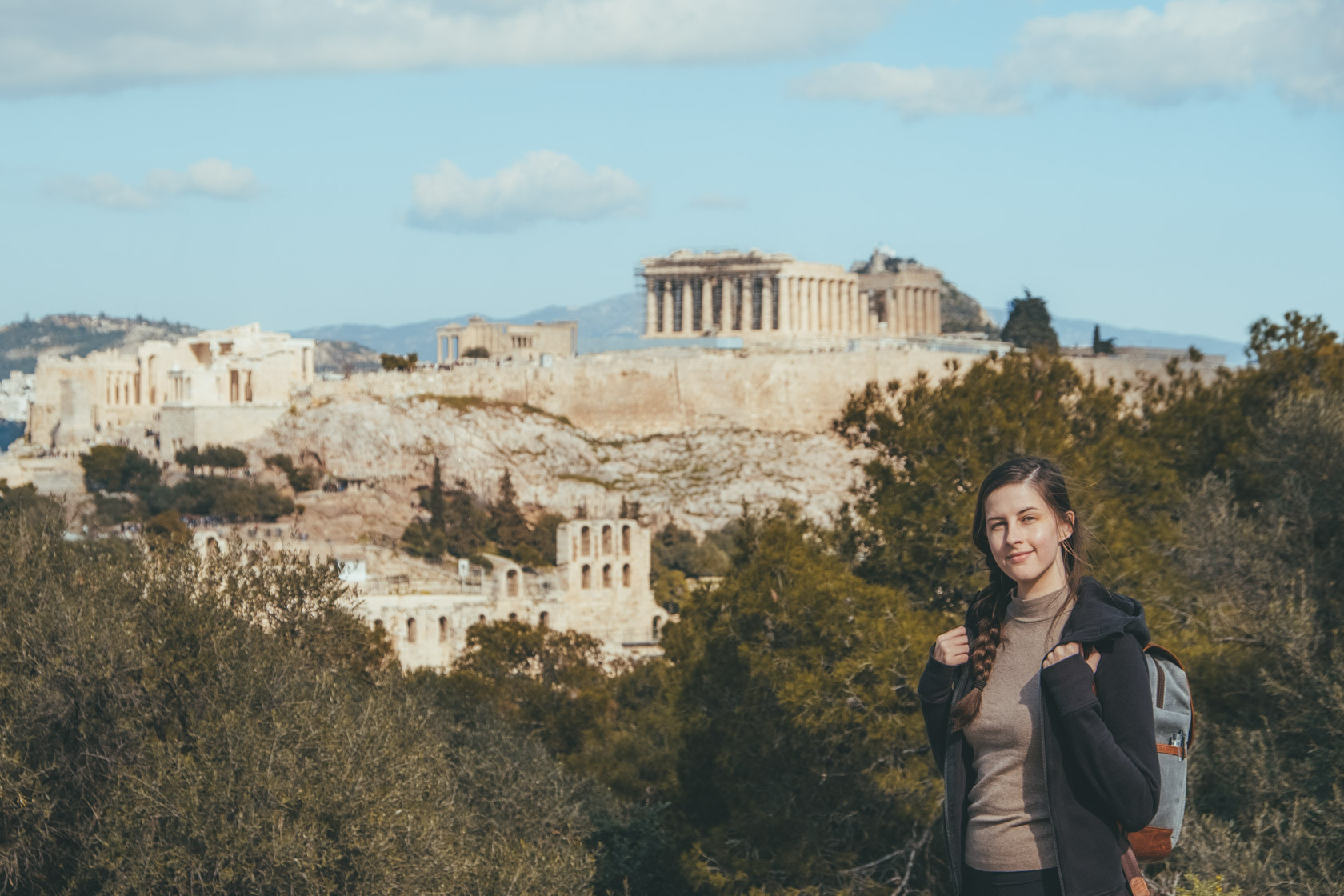
Hadrian’s Arch
Heading back down into the city, feel free to stop in Plaka for lunch before continuing the sight-seeing. If you haven’t seen it yet just from wandering around, pop by Hadrian's Arch . As I mentioned before, Hadrian was a Roman emperor, but his arch is still nice 😉 If you stand at a specific angle, you can even capture the Acropolis through the arch itself.
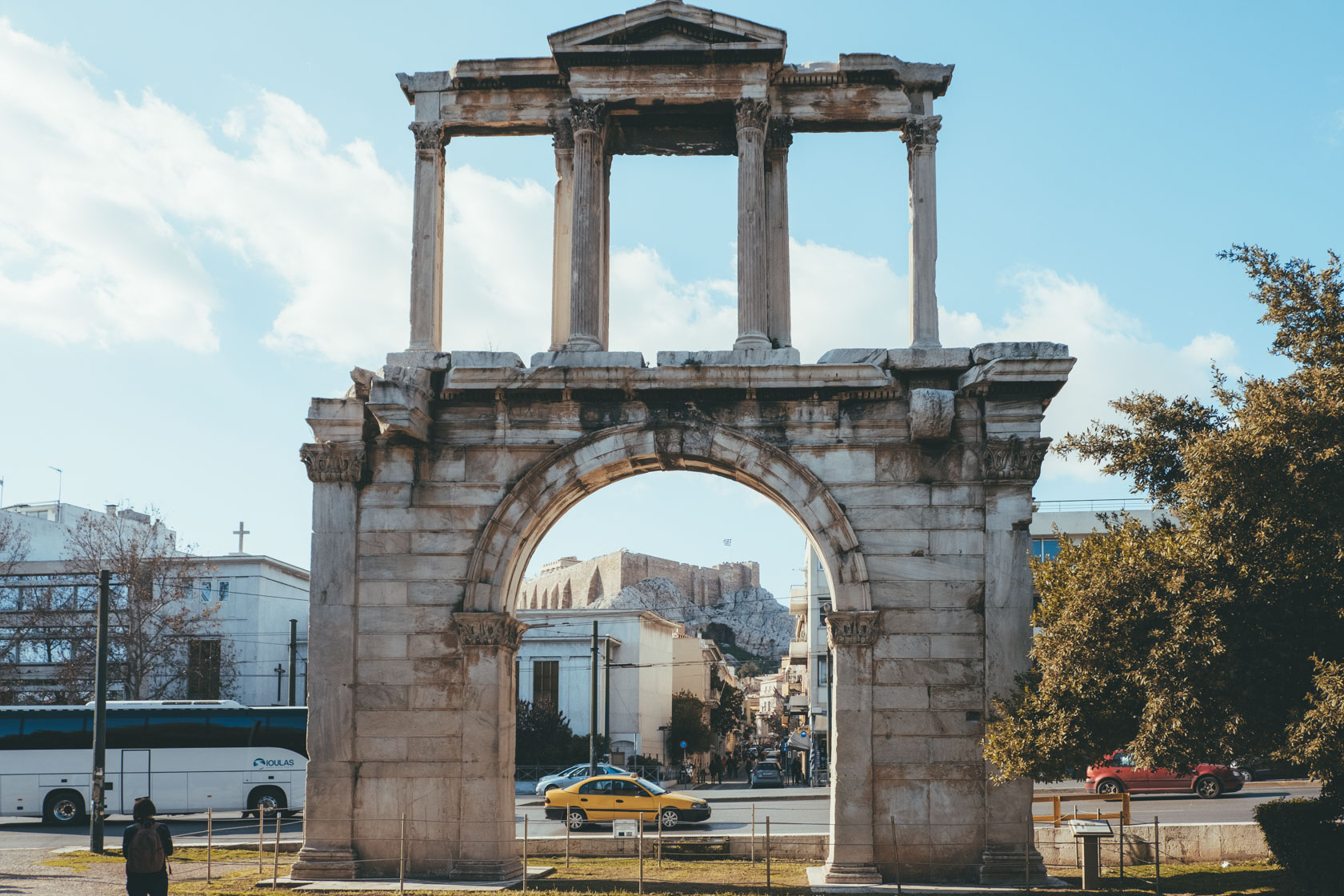
Temple of Olympian Zeus
Like many of the temples in Athens, after the Temple of Olympian Zeus fell out of use, its materials were permanently “borrowed” to build other structures in the city. But while it was still in tact, this colossal temple was built during the rule of Athenian tyrants who envisioned it as the greatest temple in the world. Like a lot of structures, it was finished under the Roman Emperor Hadrian (yes, he was a busy guy). Even though it took over 600 years for the temple to be built, it was only actively used for about 100 years.
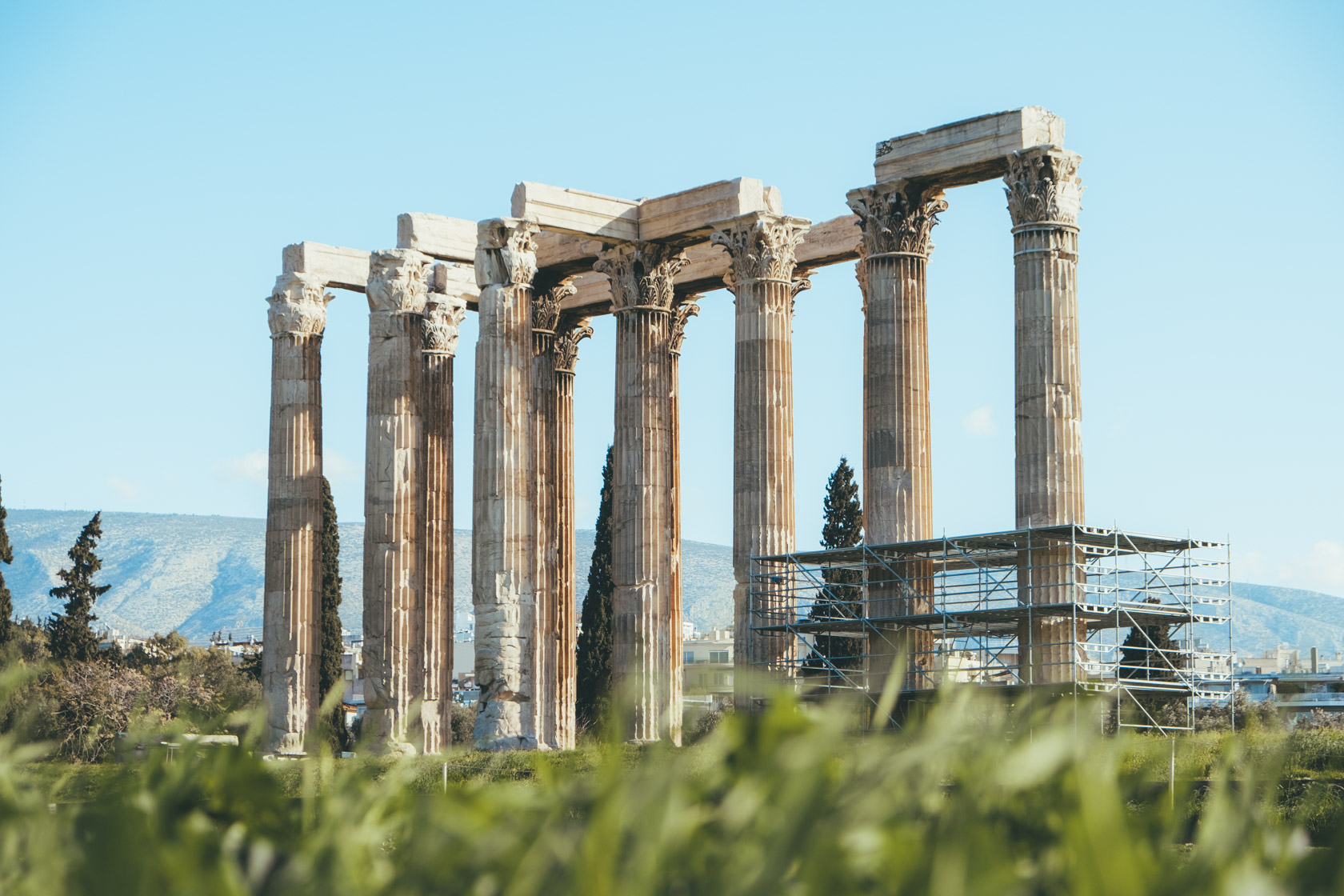
Panathenaic Stadium
This stadium is epic because it’s the only stadium in the world built entirely of marble. Sounds like a lot of work, huh? It was originally built for the Panathenaic Games (which is what inspired the modern Olympic Games), and then re-built by Herodes Atticus, reaching a capacity of 50,000 seats. Unfortunately, tickets to the stadium aren’t included in the combination ticket, but are still pretty affordable at just 5€ per person.
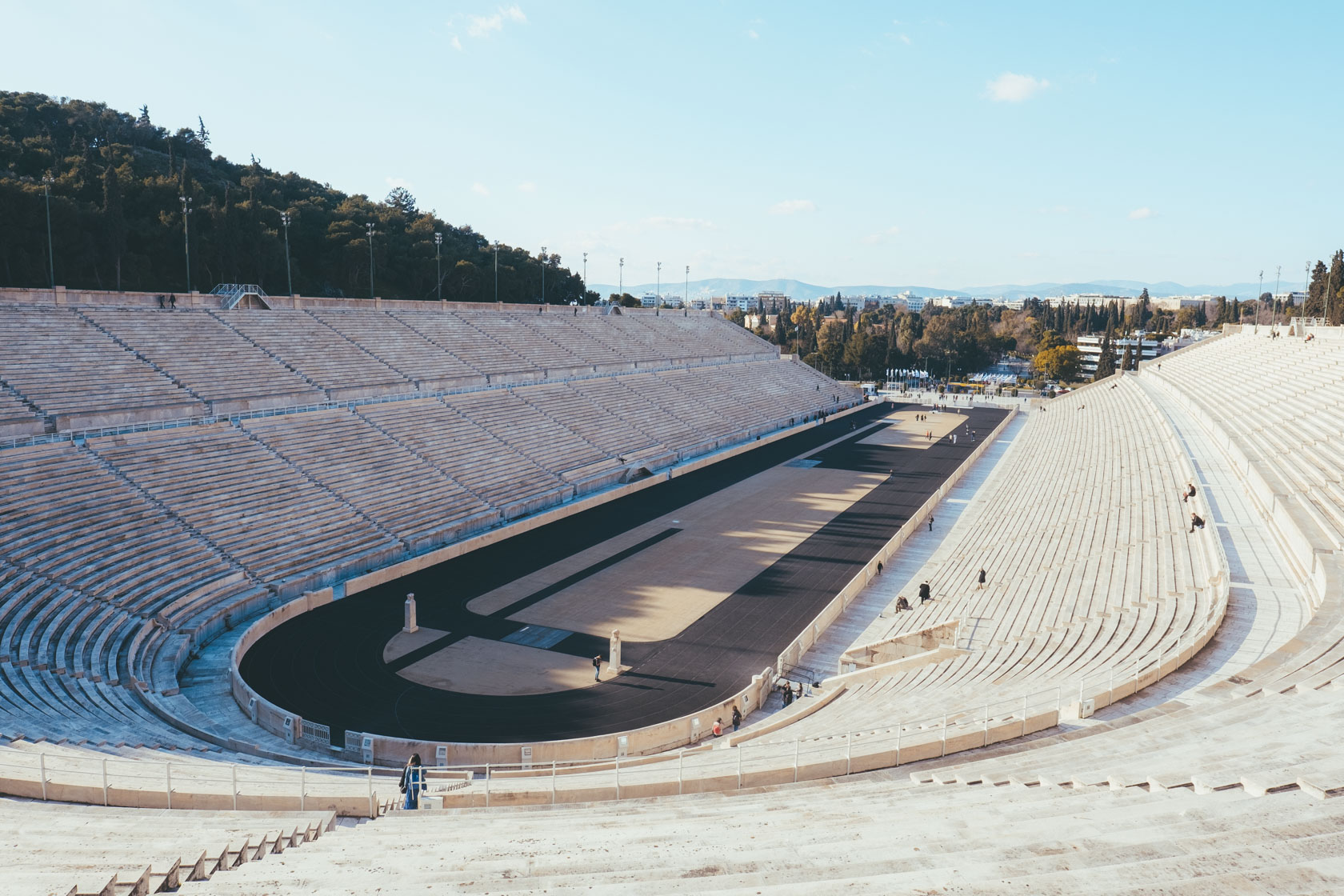
Lycabettus Hill
Hands down, Lycabettus Hill is one of the best places to enjoy sunset over Athens. You have three options for getting to the top: take the cable car, drive part-way up and then walk, or walk the entire way. For the sake of time (and having done a lot of walking!), we opted for the cable car which was 15€ for two people (cash only!). Unfortunately, the cable car is under ground so you don’t see a view until you emerge at the top of this hill.

From Lycabettus Hill, you can see the Acropolis and especially the Parthenon illuminated around sunset. There is both a Sky Bar and a look out point, but the best views come from the path that leads to the top. Show up about an hour before sunset, bring some cold ones, and watch the sun sink into the Saronic Gulf!
Day 3: Day trip to the Peloponnese region
Although there’s a lot more you can do in Athens, most people who visit the city tend to use it as a jumping-off point for visiting places like Santorini or Mykonos in the Cyclades, or perhaps to the ancient monasteries of Meteora .
But besides those places, there are excellent day trips from Athens that are easier to reach and can be done without feeling rushed.
After looking at all our options, we opted to visit three important historical places outside of Athens: Mycenae (the former center of Greek civilization and military stronghold during the eponymous Mycenaean Period), Epidaurus (home to the world’s best-preserved Greek amphitheatre), and Nafplio (Greece’s prettiest mainland town, and the first capital of Greece).
To reach these locations you have two options: Booking a rental car or going on a guided tour.
We decided to drive, especially because we’re already knowledgeable about Greek history. Otherwise, we would’ve strongly considered taking a guided tour. Either click here to book a rental car in Athens or click here to check availability of guided tours to locations recommended in this guide!
Mycenae
Located about 75 miles (120 kilometers) from Athens, Mycenae had its peak in 1350 BC when the citadel and lower town had a population of about 30,000 people. The reason it was so easy for archaeologists to identify Mycenae is because of the Lion’s Gate (pictured below), which was described by Pausanias, a Greek geographer from the 2nd century AD.
The Lion’s Gate is the only surviving piece of Mycenaean sculpture. It’s also an example of Cyclopean architecture, meaning the rocks used to build the gate are so big, it was thought that a cyclops must’ve helped build it 😂
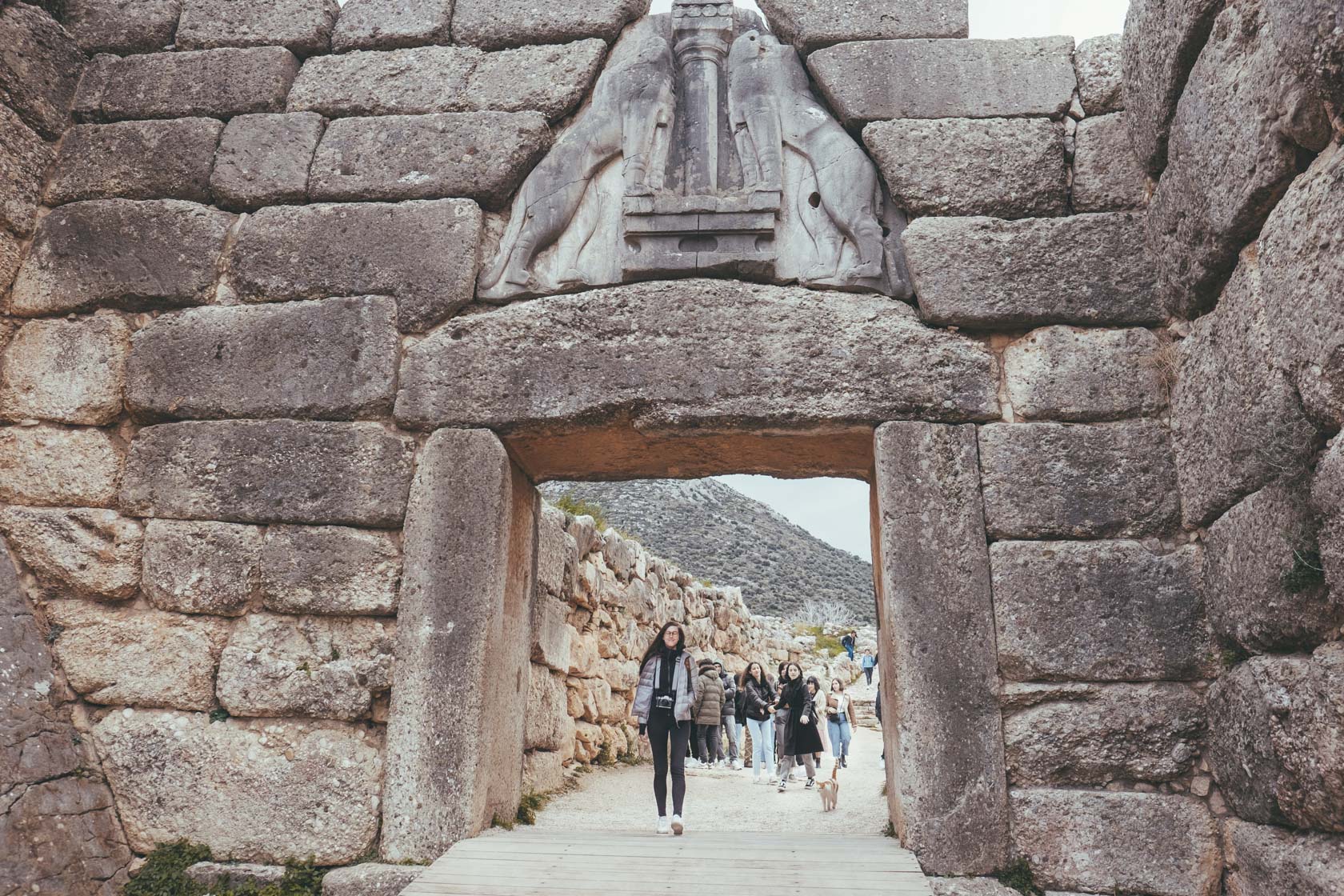
Mycenae is so cool for a number of reasons: first, you get to see the setup of towns similar to those described in Homer’s Iliad (which took place during the Mycenaean Period). If you haven’t read the Iliad at least during high school, it’s kind of like the movie Troy 😂
Speaking of Troy, you can also visit the Tomb of Agamemnon (called the Treasury of Atreus) while you’re in Mycenae.
The Mycenaeans are also awesome because they were among the first cultures to have a system of writing. They borrowed writing from the Minoan civilization (who developed Linear A), and created their own script called Linear B. In the museum at Mycenae, you can see some original tablets of Linear B writing – some of the oldest human writing in the entire world!
Epidaurus
Our buddy Pausanias, whose work helped identify Mycenae, also wrote about Epidaurus , describing it as a theatre of symmetry and beauty. While it’s not as big as some of the other theatres we’ve seen in Athens, hosting a modest 13,000-14,000 spectators, it’s in fantastic shape for the fact that it was built in the 4th century BC. Its acoustics are world-famous, and is still used today to perform ancient drama plays.
In fact, it’s considered to be the “most perfect” ancient Greek theatre with regards to acoustics. There was literally a study done on it, including measurements and all kinds of science.
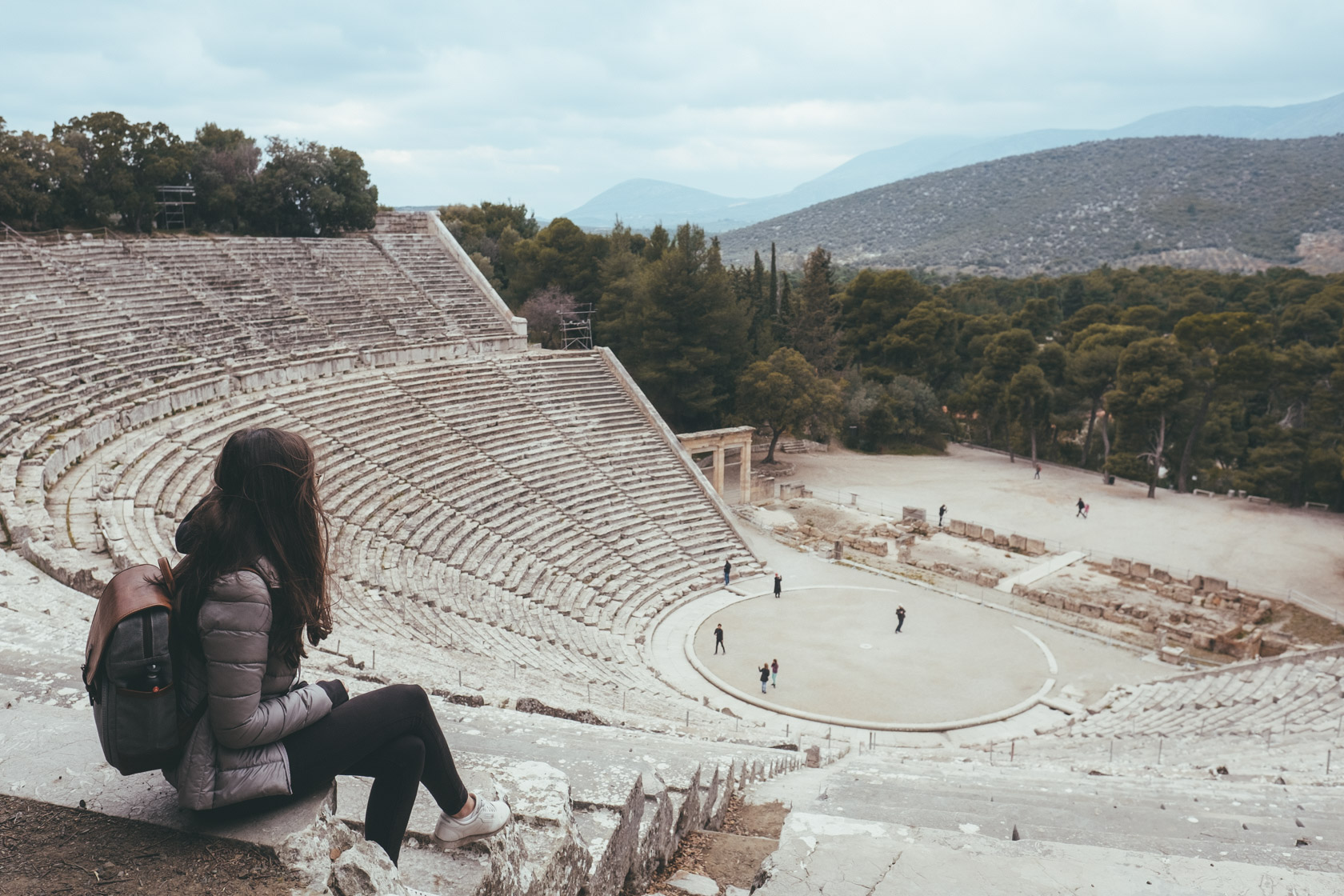
The Ancient Theatre of Epidaurus is part of a larger sanctuary dedicated to Asclepius, the Greek god of medicine. People would come and sleep here, hoping to be healed by the gods as they rested. There were places to sleep, places to bathe, and obviously places to watch entertainment.
Nafplio (also called Nauplia)
This sleepy seaside town has an epic past, as the first capital of the First Hellenic Republic and of the Kingdom of Greece, back when the Greeks were fighting for independence from the Ottoman Empire.
There are two main structures that are interesting for visitors, though both are comparatively modern: the Castle of Palamidi and the Bourtzi .
The Castle was built as a fortress by the Venetians when they occupied the area in the late 1600s to early 1700s. The Turks eventually captured it, and it was later recaptured by the Greeks. Reaching the tops requires traversing over 1,000 stairs!
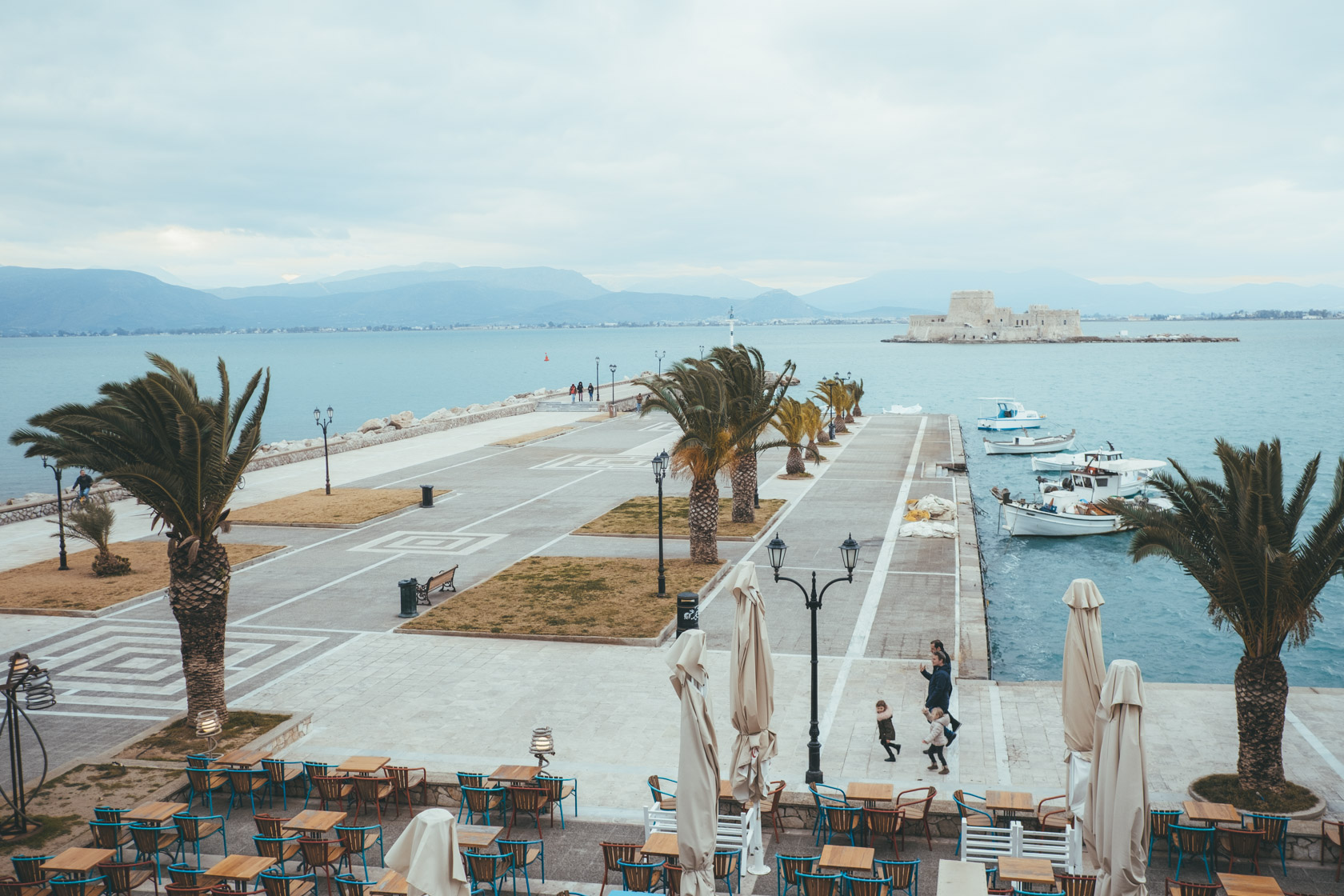
Bourtzi was also built by the Venetians, but got its current name from the Ottoman Turks. It’s possible to take a ferry and walk around.
Apart from these two main sights, Nafplio is just a lovely town with colorful buildings, lots of places to eat and enjoy a glass of wine, and the color of the water is superb (even though we were there on a cloudy day in February!). It’s an extremely popular day trip from Athens.
More great day trips from Athens
The Peloponnese Region is one of the easiest and best Athens day trips, but there are a number of other options, whether you’re looking for sun and sea or more archaeology (that rhymed, didn’t mean to!). Read my post on the best day trips from Athens for the 7 best places to visit from Athens and the most efficient ways reach them.
Best restaurants and bars in Athens
Eating is one of my favorite past times, and nowhere is this more enjoyable than in Greece. Here are my top tips for places to eat and drink for all kinds of budgets and tastes.
- The Underdog Coffee WiFi – Excellent craft coffee in Athens, and a decent spot for breakfast, too. They also have wifi and outlets in case you need to get some work done.
- Scholarhio Dinner – Multi-course menu for 15€ per person, including drinks, salads, appetizers, main courses, and dessert. Delicious and a great deal, we were immobilized afterwards!
- Couleur Locale Rooftop bar – Great cocktails and a full dinner menu, one of the best views of the Acropolis. Show up early for a seat!
- Vegan Beat Vegan – Super tasty vegan gyros at a great price. A little bit hidden, but well worth it if you’re open to having vegan takes on traditional Greek food.
- Kain Bar WiFi – Some of the best WiFi and all-day cocktails? Yes and yes. Stop by Kain if you need to get some work done…but not too much work 😉
How to get around Athens
From the airport the easiest thing to do is to use the metro. The metro from the airport will connect you directly with many important stops, such as Monastiraki (the main square of Athens). There’s a decent chance wherever you’re staying has a connection to this subway line.
Getting around town, you can mostly walk! Almost all the sights you’ll see in two or three days in Athens are centrally located. If your feet get tired, taking a taxi is very affordable (4-6 EUR from one end of the center to another), and you can book a metered taxi through the Uber app.
Best time to visit Athens
Athens in Summer is one of the most popular times to visit, thanks to the sunny weather. However, it’s a very popular tourist destination so if you’re booking in the high season, make sure you do so IN ADVANCE! Owing to the heat, I’d recommend opting for early summer (May or June) or late summer (September or even October) to avoid the heat.
Athens in Winter is when we visited, and I have to say it was so nice not having to battle the crowds. We walked in to any restaurant without a reservation and had no issues, hardly had to wait in a single line, and out of the 8 days we were there, we had sunshine and warm weather for 6 of them. Not bad!
Planning more travel in Greece?
I aboslutely love visiting Greece, and my trip to Athens marks my third trip to the country. Here are guides I’ve written from my other trips, which you might find useful if you’ll be continuing to travel in mainland Greece!



